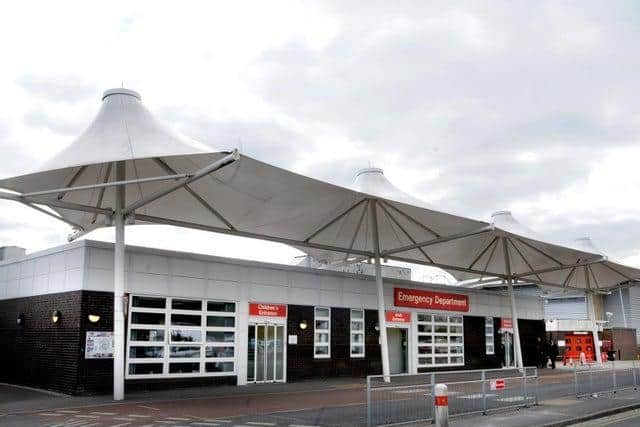Booking system planned at Lancashire A&Es for less serious cases
and live on Freeview channel 276
Under the “NHS 111 First” initiative” residents will be asked to call the established non-emergency number for a remote assessment of their condition and to be told when - and whether - they should attend, rather than just turning up at the door of the facilities.
The system will be set up on a hospital-by-hospital basis and will come to all parts of the county by the end of November. Blackpool Victoria was an early adopter of the process last month, but the arrangements do not yet apply to any other NHS trust in Lancashire.
Advertisement
Hide AdAdvertisement
Hide AdA meeting of Lancashire County Council’s health scrutiny committee heard that the measures had been devised in order to help avoid over-crowding in A&E departments during a winter period in which the usual seasonal demands on the NHS are likely to be exacerbated by coronavirus.


Dr. Amanda Doyle, chief officer of the Lancashire and South Cumbria integrated care system, said that the move was in recognition of the fact that it would otherwise be “almost impossible to safely socially distance” in typically busy emergency units over the winter months.
The planned new set-up, which stems from a national directive, is not intended for the most seriously ill patients who require an ambulance. Instead, it will be targeted at the 60 percent of patients in Lancashire who currently visit A&E departments under their own steam.
“We are trying to make sure we have assessed people first so that they only go to A&E if they need to – and, if they do, they are given an appointment so that we manage the flow,” Dr. Doyle explained.
Advertisement
Hide AdAdvertisement
Hide Ad“It means that people are waiting around to be seen for a much shorter time, so the risk of transmission of infection is much lower.
“It should improve clinical outcomes., because everybody who attends will have had a first clinical assessment remotely - so we are expecting to see a greater proportion of people in the right place for their condition.
“This is absolutely not about life-threatening emergencies - so if 999 is the solution, then that carries on as usual.”
The committee heard that people calling 111 before attending A&E will initially be put through to a soon-to-be expanded team of health advisers who answer all calls to the number in the North West from a base in Bolton.
Advertisement
Hide AdAdvertisement
Hide AdDepending on the outcome of a discussion directed by a clinical algorithm, the call-hander will either dispatch an ambulance for anybody deemed to need one, or pass the patient to a more locally-based clinician who will assess whether they should visit A&E.
The individual will then either be booked an appointment at the unit – or at an alternative facility if that is considered the more appropriate way to treat their problem. That could include a hospital clinic, GP surgery or mental health service.
Dr. Doyle said that it would reduce the use of A&E as “a filter “ to other parts of the hospital.
GPs across Lancashire have also made appointments available specifically to be booked for 111 referrals.
Advertisement
Hide AdAdvertisement
Hide Ad“The clinician on the phone will book that slot, so it won’t be [a case] of passing someone on to go away and ring their GP,” said Dr. Doyle, although she accepted that local variations may mean some people would require a call back from their surgery to finalise the arrangements.
Members were told that the target was for 20 percent of people who use A&E to make a call to the 111 number before making a trip to the hospital.
However, uptake in areas where the initiative is already in operation – including Blackpool, where “positive” feedback has been received from staff and patients – has led NHS bosses in Lancashire to conclude that a greater proportion of patients will ultimately make use of the new system.
Committee member Margaret France, a retired Chorley GP of more than 30 years, wanted to be assured that the call-handlers would be suitably trained seeing as they would come from “a variety of different backgrounds, not necessarily health-related”.
Advertisement
Hide AdAdvertisement
Hide AdJackie Bell, head of service for 111 at the North West Regional Ambulance Service – which operates the non-emergency number in the region – said that the newly-recruited health advisers answering the calls would be given six weeks’ worth of training, as required under national rules.
“The NHS pathways algorithm tool [that the call-handlers will follow] has been designed by clinicians for use by non-clinicians. But they are overseen in the room by a clinical workforce - and that’s why we’re recruiting clinicians as well,” Ms. Bell explained.
The call-takers are then supervised for a further two weeks when they first start to do the job and receive ongoing feedback about the “quality” of their work, she added.
The committee was told that the NHS 111 First scheme will be funded at a national level.
Comment Guidelines
National World encourages reader discussion on our stories. User feedback, insights and back-and-forth exchanges add a rich layer of context to reporting. Please review our Community Guidelines before commenting.